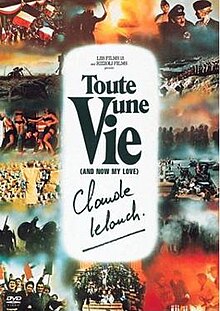And Now My Love
| And Now My Love | |
|---|---|

And Now My Love DVD cover
|
|
| Directed by | Claude Lelouch |
| Produced by | Claude Lelouch |
| Written by | Claude Lelouch Pierre Uytterhoeven |
| Starring |
Marthe Keller André Dussollier |
| Music by |
Charles Aznavour Francis Lai |
| Cinematography | Jean Collomb |
| Edited by | Georges Klotz |
| Distributed by |
TF1 Vidéo (France) Embassy Pictures (USA) |
|
Release date
|
15 May 1974 (France) March 21, 1975 (USA) |
|
Running time
|
150 min (French version) 121 min (U.S. version) |
| Country | France Italy |
| Language |
French English |
And Now My Love (French: Toute une vie), (Released as 'A Whole Lifetime' in Australia) is a film released in 1974 by French writer/director Claude Lelouch, starring Marthe Keller, André Dussollier, Charles Denner, and Charles Gérard. The American title derives from the use of the Gilbert Bécaud song "Et Maintenant" at the film's climax; the song title literally translates as "And Now," and the song became a worldwide hit when it was recorded with English lyrics as "What Now My Love".
And Now My Love was nominated for the Best Original Screenplay Academy Award in 1975. The film was also screened at the 1974 Cannes Film Festival, but wasn't entered into the main competition.
The story begins in France with a black-and-white, silent film-style sequence in the pre-World War I era, where a woman (Judith Magre) meets a man (Charles Denner) operating a prototypical Lumiere movie camera in a park. After charming her into taking a turn operating the crank on his camera, she is next seen bearing his child while he is enlisted in the French army, documenting soldiers in a trench. He receives a telegram announcing the birth of his son, but is killed by enemy fire quickly after. His widow and young son are given posthumous medals for his service by a general (Daniel Boulanger). The general later takes a fancy to a chorus girl (Marthe Keller), whom he quickly marries. His wife bears him a daughter, but is previously shown cheating on him with his younger aide-de-camp. The general kills her upon discovering her infidelity. (This scene is omitted, but flashed back to later on, in the U.S. release version.) On the same day as her death, the shooting of the Romanov family takes place, and a brief montage of the succeeding Russian leaders is shown.
...
Wikipedia
